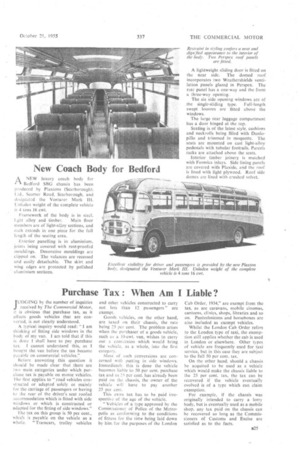Purchase Tax : When Am I Liable?
Page 59

If you've noticed an error in this article please click here to report it so we can fix it.
JUDG[NG by the number of inquiries received by The Commercial Motor, it is obvious that purchase tax, as it affects goods vehicles that are converted, is not clearly understood.
A typical inquiry would read: "I am thinking of 'fitting side windows in the body of my van. I am told that if this is done I shall have to pay purchase tax. I cannot understand this, as I hottaht the van before the tax became Payable on commercial vehicles."
Before answering this question it should be made clear that there are two main categories under which purchase tax is payable on motor vehicles. The first applies to "road vehicles constructed or adapted 'solely or mainly for the carriage of passengers or having to the rear of the driver's seat roofed accommodation which is fitted with side windows or which is constructed or adapted for the fitting of side windows."
The tax on this group is 50 per cent., which is payable on the vehicle as a whole, "Tramcars, trolley vehicles and other vehicles constructed to carry not less than 12 passengers" are exempt.
Goods vehicles, on the other hand, are taxed on their chassis, the rate being 25 per cent. The problem arises when the purchaser of a goods vehicle, such as a 10-cwt. van, wishes to carry out a conversion which would bring the vehicle, as a whole, into the first category.
Most of such conversions are concerned with putting in side windows. Immediately this is done the vehicle becomes liable to 50 per cent, purchase tax and as 25 per cent, has already been paid on the chassis, the owner of the vehicle will have to pay another 25 per cent.
This extra tax has to be paid irrespective of the age of the vehicle.
"Vehicles of a type approved by the Commissioner of Police of the Metropolis as conforming to the conditions of fitness for the time being laid down by him for the purposes of the London Cab Order, 1934," are exempt from the tax, as are caravans, mobile cinemas, canteens, clinics, shops, libraries and so on. Pantechnicons and horseboxes are also included as exempt vehicles.
Whilst the London Cab Order refers to the London type of taxi, the exemption still applies whether the cab is used in London or elsewhere. Other types of vehicle are frequently used for taxi service, but in this case they are subject to the full 50 per cent. tax.
On the other hand, should a chassis be acquired to be used as a vehicle which would make the chassis liable to the 25 per cent, tax, the tax can be recovered if the vehicle eventually evolved is of a type which can claim exemption.
For example, if the chassis was originally intended to carry a lorry body, but is eventually used as a mobile shop, any tax paid on the chassis can he recovered so long as the Commissioners of Customs and Excise are satisfied as to the facts.




































































































